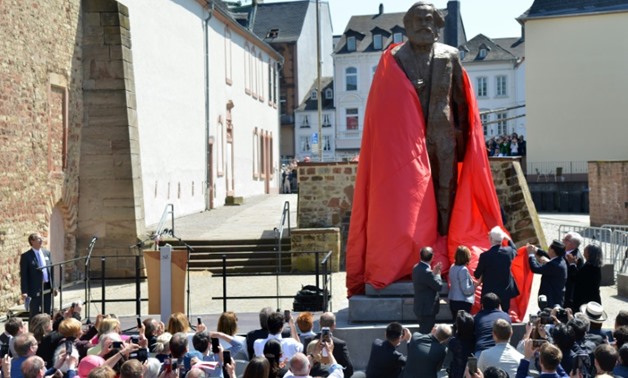
Visitors look on as a statue of German revolutionary thinker Karl Marx is unveiled in his native city © dpa/AFP / Harald Tittel
6 May 2018: Germany marked the 200th anniversary of Karl Marx's birth on Saturday, but the event was marred by protests against the revolutionary philosopher who remains a divisive figure almost three decades after the fall of the Berlin Wall.
Marx's birth city of Trier led commemorations of the man officials describe as a "great son of the city", with 600 events planned around the 19th-century scholar hailed for foretelling the ills of capitalism.
The centrepiece of the festivities was the unveiling of a 5.5-metre (18-foot) tall statue of the philosopher -- a gift from communist China.
It was wrapped in a red cloth and nearly 1,500 people attended the event, police said, including a Chinese delegation and the head of Germany's Social Democrats (SPD).
It shows Marx in a frock coat striding forward.
SPD chief Andrea Nahles said Marx was still relevant, adding: "We are well advised to re-read some of his analyses in the context of present times."
A permanent exhibition was also unveiled at the house where he was born on May 5, 1818.
However, scores of people from an association representing victims of communism marched with a banner showing Marx sitting on human skulls. They blame him for inspiring Stalinist regimes.
"We want to protest loudly against the unveiling of the Marx statue and raise our voices against the glorification of Marxism," said Dieter Dombrowski, president of the Union of the Victim Groups of Communist Tyranny.
For Dombrowski, Trier's decision to accept the gift from China is "disrespectful and inhuman" to those who suffered under communist regimes.
Far-right party AfD, which enjoys strong support in former East German states, staged a silent march with the theme "Get Marx off the pedestal" through Trier's city centre.
- 'Neither glorify nor vilify' -
Born in the western German city close to the border with Luxembourg, Marx developed his theories as the Industrial Revolution gathered pace.
His works such as the Communist Manifesto and Das Kapital subsequently became compulsory course material in countries under communist regimes, with revolutionaries from Vladimir Lenin to Mao Zedong seizing on Marx's ideas.
China's President Xi Jinping on Friday said the Asian giant's communist party will forever remain "guardians and practitioners" of Marxism, while Vietnamese leader Tran Dai Quang also penned a gushing commentary marking Marx's birth.
Due to Marx's reputation as the Father of Communism, he was largely derided in the former capitalist West Germany during the Cold War.
But since reunification, and particularly over the past decade, unbridled capitalism and its discontents have fuelled renewed interest in Marx's work.
His theories on inequality and oppression of the working class find resonance today as societies once again see social and political upheaval.
Rainer Auts, director of a company set up to oversee the exhibitions on Marx's life, works and legacy, said that more than a quarter century after reunification it was now time to reexamine the philosopher who left Germany deeply divided.
"We're not looking to glorify or vilify him. But we want to show him as a person in his time, as well as show where he may have gone wrong," Auts told AFP.
Speaking in Trier on Friday, European Commission chief Jean-Claude Juncker said that Marx "wasn't responsible for all the atrocities for which his supposed heirs must answer."
But the gigantic statue gifted by Beijing has sparked accusations of a city seeking to capitalise on Chinese tourists or investments.
Rejecting the claims, Trier mayor Wolfram Leibe said it is simply "a gesture of friendship" from China.
"There isn't a single Chinese company in Trier. We have no economic relations with China and that means we made this decision autonomously. We are not susceptible to blackmail," he told AFP.
Leibe acknowledged that the statue could become a vandalism target, but said: "that isn't going to give me sleepless nights. It can simply be cleaned up."


Comments
Leave a Comment